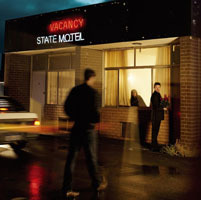
The motel room has successfully submerged itself in our collective psyche as a place of sinister happenings, albeit largely from an American context. Recent movies such as Identity and Vacancy (and the far schlockier Vacancy 2) plus the all time classic Psycho, depict the motel room as a place where horrific acts can occur. It’s a place where transience and dark deeds can transpire.
So what if you had to stay at a motel not out of a need or want, but because you had to – or rather, because the law said you had to? This is the premise of acclaimed playwright Angela Betzien’s new work, The Dark Room. The play deals with the phenomenon of commercial accommodation for foster children, that is, when children are placed in a motel with a support worker while suitable foster accommodation is found for them.
‘I thought it was a fascinating hot house environment in which the child, who had been traumatised, had been placed… and can find themselves in that situation for up to five nights,’ Betzien said of the appeal of using a motel room as the set for her new play. ‘I didn’t know that tragic reality of ours existed in our society. It’s such a potentially dramatic scenario.
‘Often the kids who are placed in commercial accommodation are the ones who are difficult to place in foster homes and juvenile accommodation centres because of behavioural issues. They might have destructive or violent behaviours that could affect other foster children or kids in residential settings. So these are highly traumatised young people who have been removed from their family situation because of reports of abuse or violence in the home and a range of different reasons. And until a placement can be found for these kids they’re housed one on one with a worker. It’s a pretty full-on situation and possibly not an ideal situation for a traumatised kid with behavioural issues.
‘So that was the starting point for the piece and it of course expanded out into several other narratives based on the idea of other people staying in that motel room based at different time periods. But all the narratives are told simultaneously, so there are all of these people occupying the same space at the same time, which I thought would be technically interesting for the actors… [to] play with the cartography of space and moving within that same room.’
The Dark Room is set in the Northern Territory, just outside of a regional town, just off the highway. The desolate backdrop adds to the tension of the plot as three sets of two characters all converge on the same motel room: Anni, a youth worker, arrives at the motel with Grace, a withdrawn young girl whom pushes Anni to cracking point; there’s Emma and Stephen, a married couple expecting their first child, who are living with a swathe of secrets that are ready to rip their relationship asunder; finally there’s Craig, a cop who has shot a kid in the line of duty, who is challenged by Joseph, a gay teenager who literally drags himself out of the desert, confronting Craig with knowledge about the officer’s past.
‘On a technical, theatrical level the audience can expect something really interesting to watch: the choreography of six actors in the one space and three separate narratives occurring simultaneously,’ said Betzien. ‘I think it’ll prove exciting to piece together the narrative and the chronology of time. I think contemporary audiences are really excited by that possibility. I think what The Dark Room tells a story that we may not be aware of, particularly one character who’s voiceless in our society and represents kids who don’t have a voice. And I think that’s what theatre should be about. It should be about telling stories that haven’t been told in an interesting and powerful way.’
The Dark Room will appear at PICA until May 17 and is directed by Adam Mitchell and will feature Black Swan State Theatre Company’s HotBed Ensemble. www.bsstc.com.au
Scott-Patrick Mitchell




